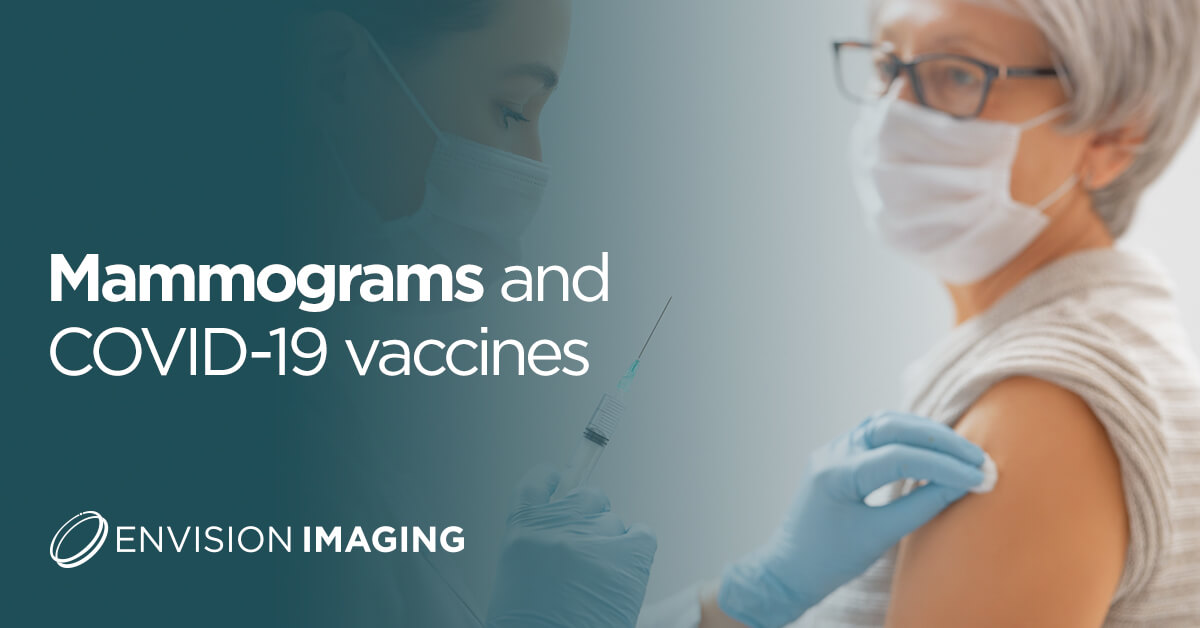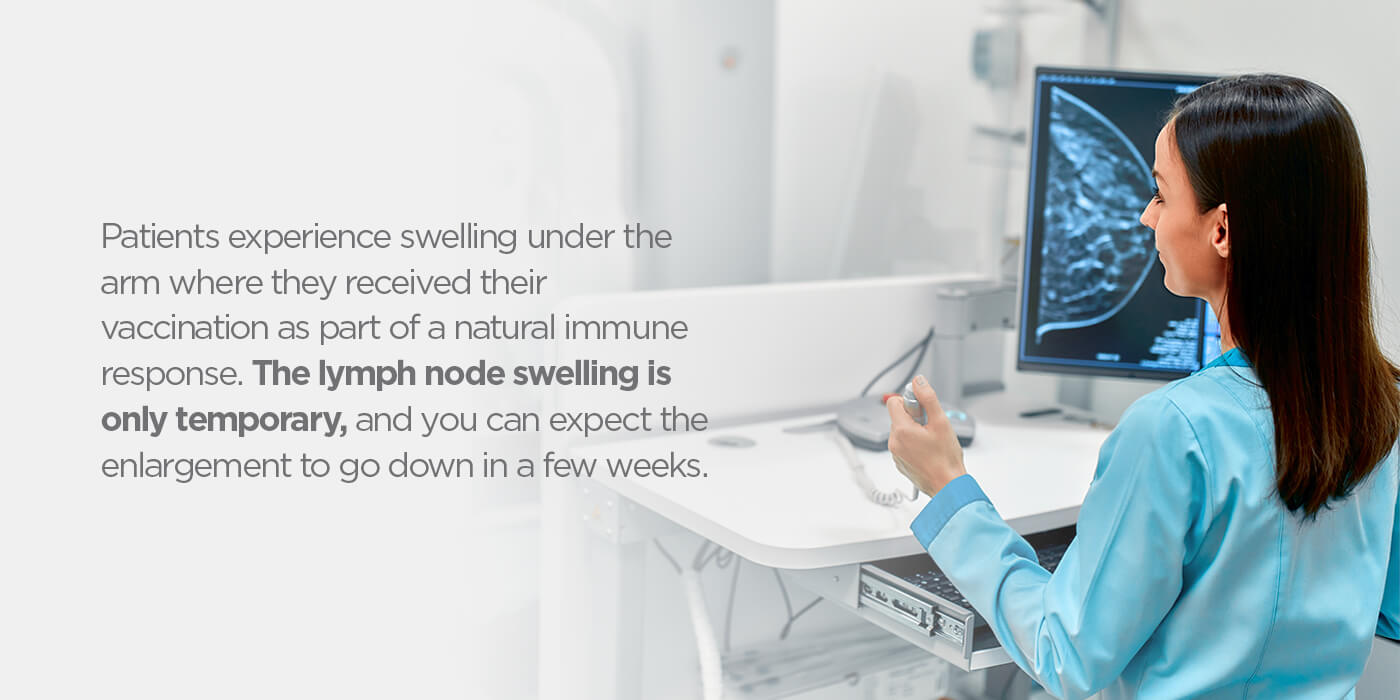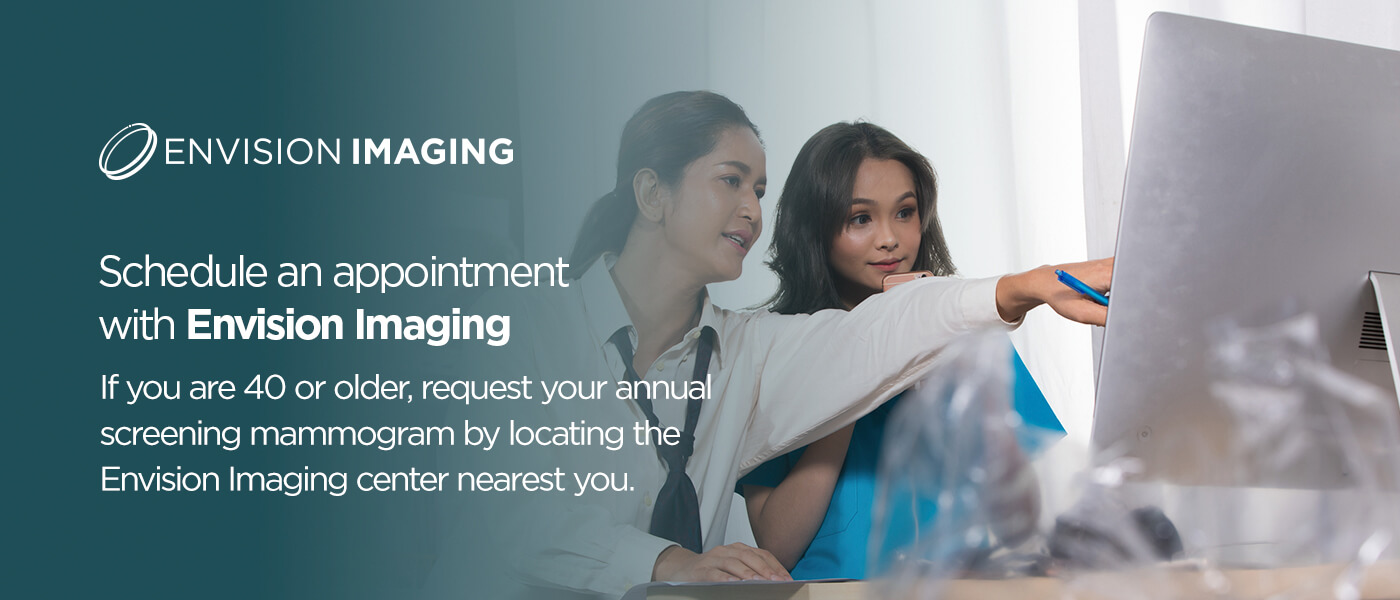Mammograms and COVID-19 vaccines

Mammograms and COVID-19 vaccines are essential preventive methods to protect yourself from two potentially deadly illnesses — breast cancer and COVID-19. However, after people get the COVID-19 vaccination, medical professionals see an increase in confused possible mammogram results due to one specific vaccine side effect — swollen lymph nodes.
Typically, swollen lymph nodes on a mammogram are a telltale sign that cancer may be present, which is why women should be aware of the effect that the COVID-19 vaccine could have on their breast screenings. In the context of vaccination, these swollen lymph nodes are benign. Here, we’ll offer you insights into the relationship between your mammograms and COVID-19 vaccines so you can take the best approach for your health as you move forward.

Can the COVID-19 vaccine affect your mammogram?
About 16% of people ages 18 to 64 and around 8.5% of people over 65 developed swollen lymph nodes within the few days following either of their COVID-19 vaccinations. This reaction is most prevalent among recipients of the Moderna or Pfizer vaccinations. Patients experience swelling under the arm where they received their vaccination as part of a natural immune response. The lymph node swelling is only temporary, and you can expect the enlargement to go down in a few weeks. However, this side effect of the COVID-19 vaccine can show up on a mammogram and raise red flags to your health care provider that there may be signs of breast cancer, often linked with swollen lymph nodes near the breasts.
Why do your lymph nodes swell?
Lymph nodes are a component of your body’s lymphatic system, which is part of your immune system that protects you against disease and infections. You have clusters of lymph nodes all over your body, such as under your arms and in your neck and groin areas. They function as filters, meant to trap germs before they can spread throughout your body, and their swelling indicates illness.
When you get a vaccine, your immune system activates in response to something unfamiliar in the body. That’s why you might notice swelling under the arm in which you received your vaccination as a response to the unknown vaccine.
What happens when enlarged lymph nodes show on your mammogram?
A reaction of swollen lymph nodes from the COVID-19 vaccination is nothing to worry about. Still, you must be aware of this potential side effect because if it shows up on your mammogram, your doctor will worry that the swelling is a sign of breast cancer and will likely want to dig deeper to assure that you are in good health. Do not entirely write off the potential that the swelling is a sign of more than a reaction to your vaccination. Here are some potential steps you can take to move forward in this situation.
- Consult your doctor: Tell your health care provider about your recent COVID-19 vaccination and any other health issues that might be bothering you. They will need a complete picture of your health to help you make an informed decision on how to move forward.
- Follow your instincts: Your body has various ways of telling you when something may be wrong. Listen to your gut, and speak to your doctor about any concerns you may have. Don’t forget to consider your medical history and family history, too. Ensure your health professional has access to that information.
- Be persistent: You will likely get a call-back requesting additional breast imaging, such as an ultrasound, biopsy or MRI. It’s wise to get these tests done to allow time for early detection of any health issues that may be present. As mentioned above, you know your body better than anyone else. Listen to what it tells you, and be an advocate for yourself and your health.
- Follow up: Even if you opt not to get additional testing, keep track of your node swelling and notice any changes. If swelling persists for more than six weeks, you should contact your health provider for a follow-up exam.
Scheduling your mammogram and COVID-19 vaccine
To avoid any unnecessary concerns or false positives due to swollen lymph nodes on mammograms, you can take a few approaches to schedule your mammogram and COVID-19 vaccine.
- If possible, schedule your mammogram or any other diagnostic imaging test before receiving your first dose of the COVID-19 vaccination.
- If you have already received your vaccination and the mammogram is not urgent, speak to your doctor about whether it is appropriate to schedule your mammogram four to six weeks after your second vaccine dose.
- Cancer survivors can ask to have their vaccination administered in the arm on the opposite side of their body from where the cancer is or was.
Prioritize your health
If you are experiencing any breast cancer symptoms or health concerns, have current breast problems or have received recent abnormal mammogram results, do not delay further mammograms or diagnostic testing.
If your mammogram shows abnormal results, it is paramount to follow professional advice to receive the appropriate and recommended diagnostic testing. In this case, it is better to be safe than sorry, and catching breast cancer gives you the best chances of beating it. Early detection of breast cancer in the localized stage has a five-year relative survival rate of 99%, so this is not something to procrastinate on.
Like breast screenings, COVID-19 vaccines also have the power to save lives. It is vital to protect yourself against this illness by taking whatever opportunity you can get for vaccination. People with cancer are at a heightened risk of developing severe complications from COVID-19, so the vaccine is your best bet for safety.
If timing is an issue, keep your doctor informed, but do not put off mammogram screening exams or COVID-19 vaccination appointments that are in your best interests.
Schedule an appointment with Envision Imaging
Over 2 million patients have chosen Envision Radiology for our world-class diagnostic imaging, comfortable experience, convenience and compassionate care.
If you are 40 or older, request your annual screening mammogram.
Browse our locations to request your next diagnostic imaging appointment. Our world-class facilities, compassionate care and accurate results ensure a pleasant and reliable experience.

Sources:
-
https://www.cdc.gov/vaccines/covid-19/info-by-product/moderna/reactogenicity.html
-
https://www.nationalbreastcancer.org/early-detection-of-breast-cancer/
-
https://www.envrad.com/locations/?service=mammography&zip_code=&location-submit=


